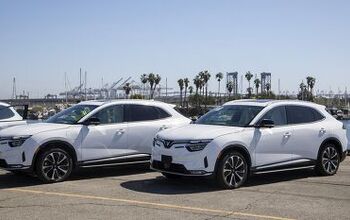SUV Fleet Owners Reamed by Residuals
As we mentioned previously, the U.S. vehicle market is about to be hit with a tsunami of off-lease SUVs. BusinessFleet is putting numbers to the news, courtesy of CNW Research's latest Retail Automotive Summary. They estimate 800k SUVs will come off lease this year, with a similar number expected next year. What makes those numbers so horrifying: residuals previously figured at 51 percent of original capitalized cost are now closer to 34 percent– assuming no further drop in value. CNW president Art Spinella estimates "that difference translates into more than $6,100 per unit in missed residual values or $4.88 billion." He estimates next year's figure could be as high as $4.74b. That's a lot of money for someone to absorb. SUV buyers note: even without GM zero percent offers on slow-selling trucks and SUVs (i.e. all of them), this is The Mother of All Truck Buyer's markets. And you've got plenty of time to shop.
More by Frank Williams


































Comments
Join the conversation
"All the hot air in DC notwithstanding, I haven’t heard anything about any actual BILLS being written or voted on to authorize new drilling off the intercontinental shelf, the Gulf of Mexico, or on federal lands." And even if such legislation were passed, it would be years (perhaps decades) until any new supplies made it to market. The explosive economic growth of China and India is almost certain to swamp any global oil supply increases, assuming they are even possible. Transitioning away from oil as the US' primary source of transportation energy is imperative.
If you were to think about real long term investments, then this is a good time to buy a top spec or special edition luxury SUV (H2, Escalade, Cayenne Turbo, Range Rover etc). and just parking it in the garage for say...50 years, then auctioning it off Barret Jackson for a nice profit (Think of the H2 as this century's Edsel).
One of my share brokers is predicting $80 oil next year, on the back of a global sort-of-recession. The latter makes it not perhaps the ideal time to buy a car, but I must admit, I'm watching freefalling prices of second hand 4x4s with great interest. Worst case scenario, convert it to LPG.
In the next year or so, the largest gasoline refineries in the world will come on line in India. It's designed to refine, high sulfer, "sour" crude. Remember, the high spot oil price is for easy to refine sweet crude. Much of what the Saudis and Iranians pump is sour, and hard to refine. Sour crude is significantly cheaper than sweet crude. The new Indian refinery is planned around exporting gasoline to Europe and the US and some analysts say that when it comes on stream the price of gas should drop about $0.60/gal. And even if such legislation were passed, it would be years (perhaps decades) until any new supplies made it to market. Not decades, about five years. Drilling in ANWR and on the continental shelf, plus developing shale and tar sands is estimated at meeting 5% of our needs. People like you say this won't affect the price of oil. Tell me, if it was anticipated that supplies would be dropping by 5%, do you think this would drive the price of oil futures up or down? Of course it would drive them up. I don't see how increasing the oil supply by the same amount wouldn't have the opposite effect of driving futures prices down. Open up drilling, commit to building more nuclear plants (including research funding for the Brussard fusion reactor), and developing shale and tar sand petrochemicals are exactly the kind of long range planning we should be doing and exactly the kind of signals to the commodities markets that will put downward pressure on oil prices.